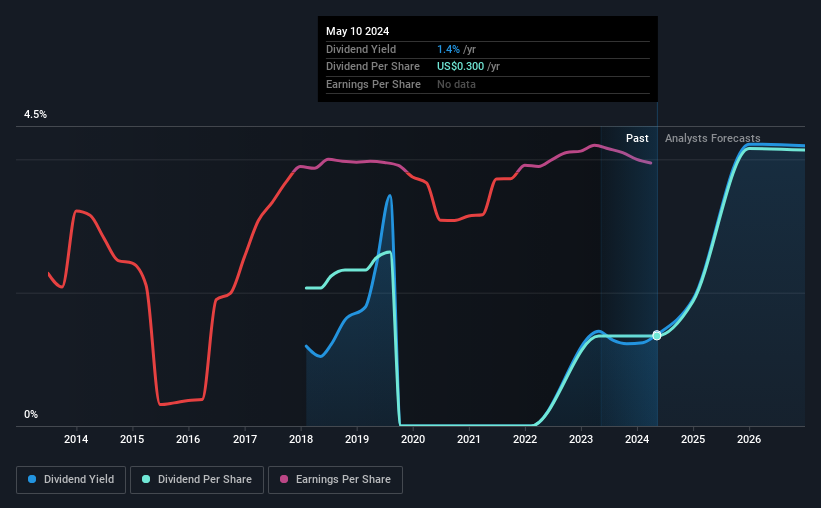Should Income Investors Look At Peabody Energy Corporation (NYSE:BTU) Before Its Ex-Dividend?
It looks like Peabody Energy Corporation (NYSE:BTU) is about to go ex-dividend in the next 3 days. The ex-dividend date is one business day before the record date, which is the cut-off date for shareholders to be present on the company's books to be eligible for a dividend payment. The ex-dividend date is important as the process of settlement involves two full business days. So if you miss that date, you would not show up on the company's books on the record date. Therefore, if you purchase Peabody Energy's shares on or after the 15th of May, you won't be eligible to receive the dividend, when it is paid on the 5th of June.
The company's next dividend payment will be US$0.075 per share, on the back of last year when the company paid a total of US$0.30 to shareholders. Looking at the last 12 months of distributions, Peabody Energy has a trailing yield of approximately 1.4% on its current stock price of US$21.88. Dividends are an important source of income to many shareholders, but the health of the business is crucial to maintaining those dividends. So we need to investigate whether Peabody Energy can afford its dividend, and if the dividend could grow.
Check out our latest analysis for Peabody Energy
Dividends are usually paid out of company profits, so if a company pays out more than it earned then its dividend is usually at greater risk of being cut. Peabody Energy has a low and conservative payout ratio of just 7.5% of its income after tax. Yet cash flows are even more important than profits for assessing a dividend, so we need to see if the company generated enough cash to pay its distribution. The good news is it paid out just 9.7% of its free cash flow in the last year.
It's encouraging to see that the dividend is covered by both profit and cash flow. This generally suggests the dividend is sustainable, as long as earnings don't drop precipitously.
Click here to see the company's payout ratio, plus analyst estimates of its future dividends.
Have Earnings And Dividends Been Growing?
Companies that aren't growing their earnings can still be valuable, but it is even more important to assess the sustainability of the dividend if it looks like the company will struggle to grow. Investors love dividends, so if earnings fall and the dividend is reduced, expect a stock to be sold off heavily at the same time. With that in mind, we're not enthused to see that Peabody Energy's earnings per share have remained effectively flat over the past five years. Better than seeing them fall off a cliff, for sure, but the best dividend stocks grow their earnings meaningfully over the long run.
Another key way to measure a company's dividend prospects is by measuring its historical rate of dividend growth. Peabody Energy's dividend payments per share have declined at 6.9% per year on average over the past six years, which is uninspiring.
Final Takeaway
Is Peabody Energy an attractive dividend stock, or better left on the shelf? Earnings per share have been flat, although at least the company is paying out a low and conservative percentage of both its earnings and cash flow. It's definitely not great to see earnings falling, but at least there may be some buffer before the dividend gets cut. It might be worth researching if the company is reinvesting in growth projects that could grow earnings and dividends in the future, but for now we're not all that optimistic on its dividend prospects.
While it's tempting to invest in Peabody Energy for the dividends alone, you should always be mindful of the risks involved. Be aware that Peabody Energy is showing 3 warning signs in our investment analysis, and 1 of those is a bit concerning...
If you're in the market for strong dividend payers, we recommend checking our selection of top dividend stocks.
Have feedback on this article? Concerned about the content? Get in touch with us directly. Alternatively, email editorial-team (at) simplywallst.com.
This article by Simply Wall St is general in nature. We provide commentary based on historical data and analyst forecasts only using an unbiased methodology and our articles are not intended to be financial advice. It does not constitute a recommendation to buy or sell any stock, and does not take account of your objectives, or your financial situation. We aim to bring you long-term focused analysis driven by fundamental data. Note that our analysis may not factor in the latest price-sensitive company announcements or qualitative material. Simply Wall St has no position in any stocks mentioned.

